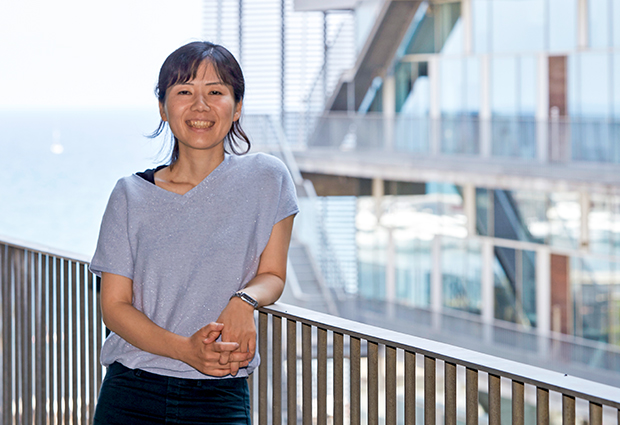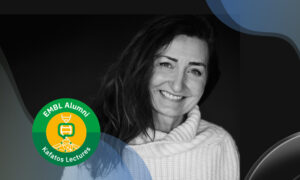
Welcome: Miki Ebisuya
New group leader at EMBL Barcelona creates artificial biological systems to study animal development

Miki Ebisuya will join EMBL Barcelona in July 2018. She creates complex cell cultures with edited genetics to mimic – and further understand – what happens during development.
Please explain your research in a nutshell.
I’m researching synthetic developmental biology. This means that we alter the genetics of cells which are cultured in the lab to recreate what happens during animal development – and further understand it. To do this, we’ve built ‘artificial gene circuits’, where five to ten genes are inserted into the genome of cells, to give them extra functions. So far, we’ve built an artificial gene circuit that makes one identical cell type spontaneously change into two different cell types. Another artificial gene circuit makes cells self-organise to form patterns, such as dots. At EMBL, we’re interested in building an artificial gene circuit that makes cells form 3D structures. Recreating these behaviours one-by-one is an important step towards creating synthetic tissue.
Sometimes artificial gene circuits aren’t enough to recreate what happens in the cell during development. This is why we’re also interested in using organoids at EMBL. Organoids are made out of stem cells and can be used to model more complex tissue and organ formation. I’m particularly interested in making organoids to study the differences that we see between animal species during development. For instance, we still don’t know why the gestational period is nine months in humans, but only twenty days in mice. We will use stem cells taken from mouse, human, rabbit, cow and pig to create organoids of different species, directly comparing them with each other to uncover these mysteries.
What first got you interested in science?
Since I was a child I’ve really liked science. I think I was inspired by my elementary school teacher. We had beautiful pictures of the universe in our classroom and she taught us how to dig for fossils and collect insects. But after entering the lab at university, I also started to like the process of science. I learnt to make a hypothesis, try the experiment, repeat it and then fail! Only once in a while do we succeed, but I really enjoy this process.
What was it like to become a group leader?
As a PhD student, you do all of the lab work yourself, so your experiments are your research. When I became independent, immediately after my PhD, I couldn’t do the most important experiments myself any more. Initially it was frustrating, but now I can enjoy the situation. It’s fun to see people in my lab make things work that I can’t.
What skills are you looking for in a student who wants to work in your lab?
I don’t expect a lot of skills from a student who is just starting out, but I want them to enjoy the process of creating experiments. By this I mean making artificial gene circuits and organoids in the lab and learning from their creations. Creating something is really difficult and in almost all cases it fails. I want someone who doesn’t give up – even if they fail a hundred times.
What inspires you?
When I see someone present their work on interesting developmental mechanisms or species differences, that really inspires me. It makes me want to recreate the idea in cell models and solve the mechanisms involved.
What advice do you have for young scientists?
Thinking about your research is more important than doing experiments. Experiments take a lot of time and effort, and we tend to devote all our time to them. But if you don’t think about the results or plan the experiments carefully enough, you lose a lot of time. I always tell my lab members to think about the direction of their research in-depth for at least 30 minutes every week.


